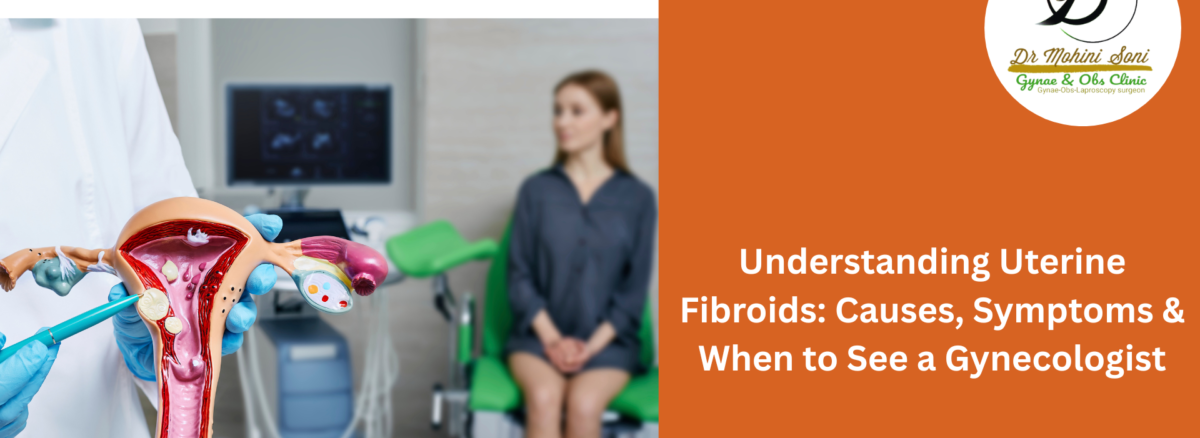In India, many women silently suffer from heavy periods, pelvic pain, or a constant bloated feeling — assuming it’s just “normal.” But often, these symptoms could point to uterine fibroids, a common yet often overlooked gynecological condition.
Uterine fibroids are non-cancerous growths that develop in or around the uterus. While they’re not life-threatening, they can severely affect your quality of life if left untreated. The good news is that fibroids can be effectively managed or treated — especially when diagnosed early.
In this blog, let’s explore what causes fibroids, their main causes of fibroids, and when you should consult a gynecologist.
What Are Uterine Fibroids?
Uterine fibroids (also called leiomyomas or myomas) are benign tumours made of muscle and fibrous tissue. They can vary in size — from a small seed to large masses that distort the shape of the uterus. Some women may have just one fibroid, while others could have multiple.
Common Causes & Risk Factors of Fibroids
The exact cause of fibroids isn’t fully known, but several factors may increase your risk:
- Hormonal Imbalance: High levels of estrogen and progesterone promote fibroid growth.
- Genetics: If your mother or sister had fibroids, you’re more likely to develop them.
- Age: Most common between 30 to 50 years, especially during reproductive age.
- Obesity: Excess body fat can influence hormone levels.
- Early Onset of Periods: Starting menstruation before age 10–12 may increase risk.
Symptoms of Uterine Fibroids
Not all fibroids cause symptoms. But when they do, you might experience:
- Heavy or prolonged menstrual bleeding
- Pelvic pain or pressure
- Frequent urination or difficulty emptying the bladder
- Pain during intercourse
- Lower back pain
- Constipation
- Abdominal bloating
- Difficulty conceiving or recurrent miscarriages
- If any of these symptoms persist, it’s time to see a qualified gynecologist for proper evaluation.
How Are Fibroids Diagnosed?
A gynecologist can detect fibroids through:
- Pelvic examination
- Ultrasound (Abdominal or Transvaginal)
- MRI or CT scan in more complex cases
- Hysteroscopy or Sonohysterography for fibroids inside the uterine cavity
Treatment Options for Uterine Fibroids
Treatment depends on the size, location, and severity of symptoms. Common options include:
- Watchful Waiting
If fibroids are small and symptom-free, regular monitoring may be enough. - Medications
Hormonal pills or injections to shrink fibroids
Pain relievers to manage cramps and discomfort
- Minimally Invasive Procedures
Uterine Artery Embolization (UAE): Cuts blood supply to fibroids
Laparoscopic Myomectomy: Removes fibroids without removing the uterus
- Surgical Options
Myomectomy: Preserves fertility by removing fibroids
Hysterectomy: Complete removal of the uterus (for severe or recurrent fibroids)
Your gynecologist will guide you on the most suitable treatment based on your health goals, especially if you’re planning pregnancy.
When to See a Gynecologist
You should consult a gynecologist if you experience:
- Unusually heavy or painful periods
- Difficulty conceiving
- Constant pelvic discomfort
- A sudden increase in abdominal size
- Frequent urge to urinate
Don’t delay — early diagnosis means better, simpler treatment options.
Conclusion:
Uterine fibroids are more common than you think — and they’re treatable. Ignoring symptoms like heavy bleeding or pelvic pain can lead to complications over time. So, don’t hesitate to speak to a trusted gynecologist in Delhi or South Delhi who can guide you with the right diagnosis and care plan.
Your health and comfort matter — and taking early action is the first step toward a better quality of life.
FAQs About Uterine Fibroids
Q1. Are uterine fibroids cancerous?
No. Fibroids are non-cancerous and very rarely turn into cancer.
Q2. Can fibroids affect fertility?
Yes, depending on their size and location, fibroids can interfere with implantation or pregnancy. However, many women with fibroids conceive and deliver healthy babies.
Q3. Do fibroids go away after menopause?
In most cases, fibroids shrink naturally after menopause due to reduced hormone levels.
Q4. Can diet help manage fibroids?
A balanced diet with less red meat and more fruits, vegetables, and fibre can help reduce estrogen levels, which may slow fibroid growth.
Q5. Is surgery always necessary for fibroids?
No. Many fibroids are managed with medications or non-surgical options, especially if caught early.

